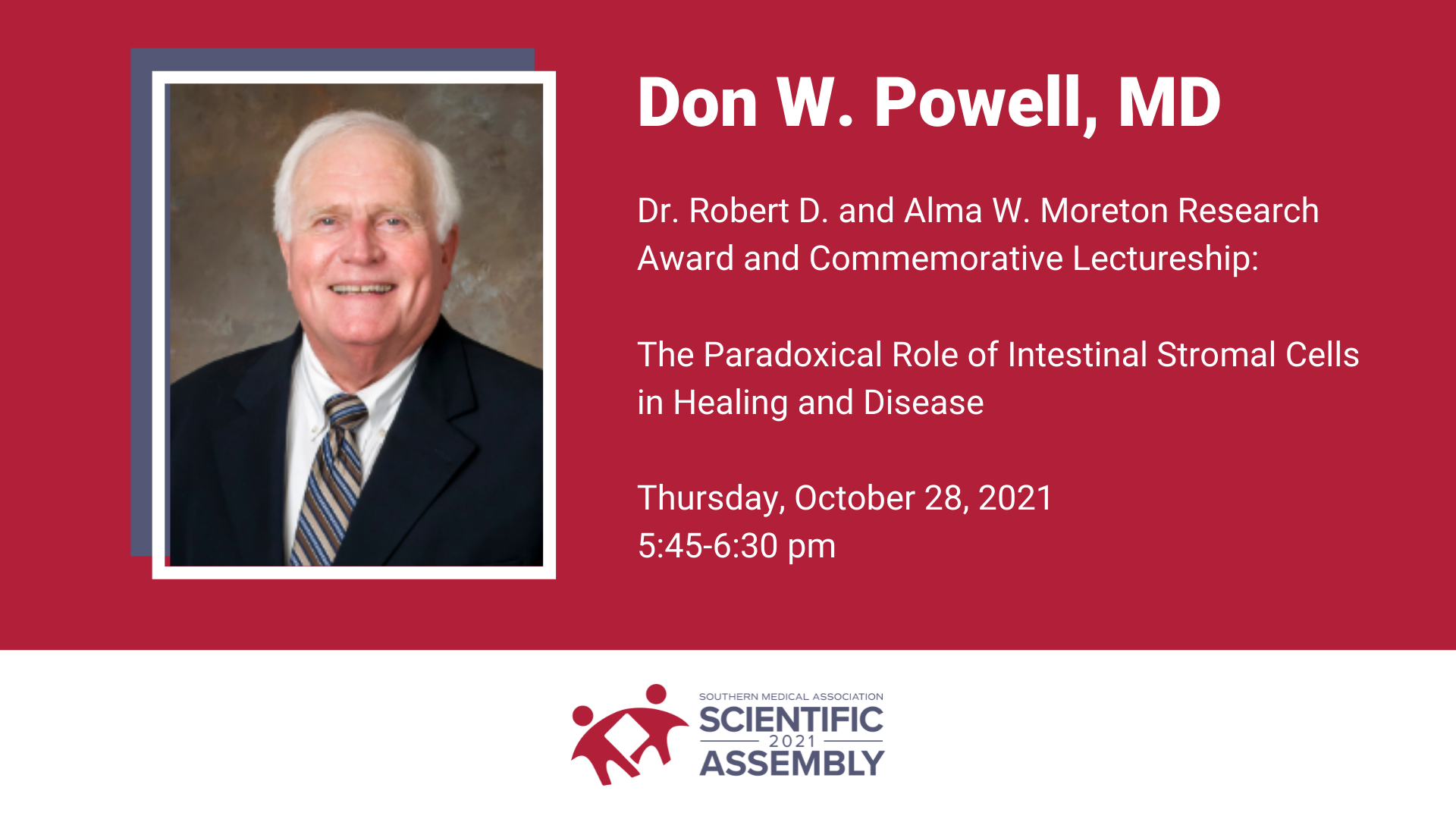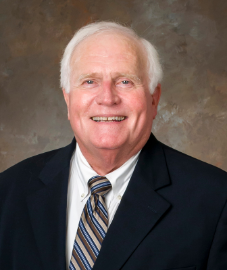
The Paradoxical Role of Intestinal Stromal Cells in Healing and Disease
For the past 25 years, Dr. Powell’s research has focused on the biology of intestinal myofibroblasts, also called activated fibroblasts,intestinal mesenchymal cells, or intestinal stromal cells. Myofibroblasts are members of a family of mesenchymal cells such as pulmonary interstitial fibroblasts, hepatic and pancreatic stellate cells, and joint synoviocytes. Located at the interface between the epithelium and lamina propria, intestinal stromal cells modulate information transfer between these tissue compartments and play a pivotal role in the regulation of the epithelial stem cell niche. By secreting stem cell factors and growth factors, stromal cells promote epithelial growth and repair. They are also non-professional antigen presenting immune cells which promote immune tolerance by expression of tolerogenic molecules such as the immune checkpoint inhibitor ligand Programed Cell Death Ligand 1 (PD-L1). When activated, they also secrete inflammatory cytokines and matrix molecules that cause inflammation and fibrosis. Thus, these cells play important roles in inflammatory diseases such as rheumatoid arthritis, asthma, and inflammatory bowel disease. Stromal cells (cancer-associated fibroblasts) are key components of the cancer microenvironment and promote cancer growth and metastasis. Immune checkpoint inhibitors such as monoclonal antibodies against PD-1 or PD-L1 have become potent anticancer immunotherapy drugs.
Previously, his laboratory made important contributions to understanding the mechanisms and regulation of intestinal electrolyte transport and the pathophysiology of secretory and inflammatory diarrheas and to the concept of epithelial barrier function. His research was funded continuously by the NIH for over 45 years.
Upon completion of this session, learners should be able to:
- Describe the role of intestinal stromal cells in wound healing, cancer, and fibrosis;
- Identify the role of stromal cells in creating a niche for expanding epithelial stem cells during intestinal healing;
- Recognize the important role of a specialized stromal cell, the cancer-associated fibroblast, in promoting tumor growth and metastasis;
- Define the rationale for immune checkpoint immunotherapy of cancer and recognize its toxicities.
Keynote Speaker: The 2021 Dr. Robert D and Alma W Moreton Original Research Award Recipient
 Don W. Powell, MD
Don W. Powell, MD
Dr. Powell is currently a Professor Emeritus in the Department of Internal Medicine/Gastroenterology at the University of Texas Medical Branch (UTMB) in Galveston. Previous academic roles there were the Edward Randel and Edward Randel, Jr Distinguished Chairman of Internal Medicine and Professor of Neuroscience, Cell Biology & Anatomy; Associate Dean for Research; Director of the UTMB Institute for Translational Sciences (CTSA) Clinical Research Center; Director of the Division of Gastroenterology and Hepatology, and Program Director of the Gastroenterology Fellowship.
A native of north Alabama (Powell, AL), he attended high school in Hattiesburg, MS. He received a BS in 1960 from Auburn University and MD with highest honors from the Medical College of Alabama (now UAB) in 1963. While in medical school, mentorship by Dr. Basil Hirschowitz, a translational scientist and inventor of the fibro-optic endoscope, led to his interest and career in gastroenterology. He completed his internal medicine residency training at Peter Bent Brigham Hospital and Yale-New Haven Community Hospital and was a Special National Institutes of Health Fellow in Physiology at Yale University. He served as Captain in the Army Medical Corp from 1965-68 at the Walter Reed Army Medical Center. Following training and military service, he was a member of the faculty at the University of North Carolina Chapel Hill from 1971-1991, where he became Professor of Medicine, Chief of the Division of Digestive Diseases and Nutrition and Director the NIH-funded Center for Gastrointestinal Biology and Disease.
Dr. Powell was an Associate Editor of the Cecil Textbook of Medicine, the Yamada Textbook of Gastroenterology, and Principles of Clinical Gastroenterology. He served on the Boards of Directors of the American Board of Internal Medicine, the Alpha Omega Alpha Honorary Medical Society, and the National Institutes of Health NIDDK Council. He was a consultant to WHO and the pharmaceutical industry. In 1993-1994 he was President of the American Gastroenterological Association (AGA) and he later received the AGA Friedenwald Medal, the AGA Mentors Research Scholar Award and a scientific session at the annual meeting- Digestive Diseases Week- was named for him. In 2016, he was awarded the Richard D. McKenna Memorial Lectureship by the Canadian Society of Gastroenterology and Hepatology. He was honored as a Master of the American College of Physicians in 1999 and the Texas Chapter Laureate in 2009. A lectureship, nursing scholarship and professorship have been endowed by grateful patients and faculty at UTMB He has been named to Best Doctors in America from 1979 to 2020 and listed in numerous yearly issues of Marquis’ Who's Who, receiving the Marquis Lifetime Achievement Award in 2017. He is an elected member of the American Association for Clinical Investigation, the Association of American Physicians and is a Fellow of the American Association for the Advancement of Science.
Suggested Reading for Learners
- Powell DW, Mifflin RC, Valentich JD, Crowe SE, Saada JI and West AB. Myofibroblasts: I. Paracrine cells important in health and disease. Am J Physiol: Cell Physiol 1999: 46:C1-C19.
- Powell DW, Pinchuk IV, Saada JI, Chen X, Mifflin RC. Mesenchymal cells of the intestinal lamina propria. Annu Rev Physiol. 2011;73:213-37.
- Roulis M, Flavell RA. Fibroblasts and myofibroblasts of the intestinal lamina propria in physiology and disease. Differentiation 2016;92:116-131.
- Biffi G, Tuveson DA. Diversity and biology of cancer-associated fibroblasts. Physiol Rev 2021: 101:147–176.
- Fritz JM, Lenardo MJ, Waldman AD. A guide to cancer immunotherapy: from T cell basic science to clinical practice. Nat RevImmunol. 2020; 20:651-668.
- Kennedy LB, Salama AKS. A Review of cancer immunotherapy toxicity. CA Cancer J Clin 2020; 70:86–104
